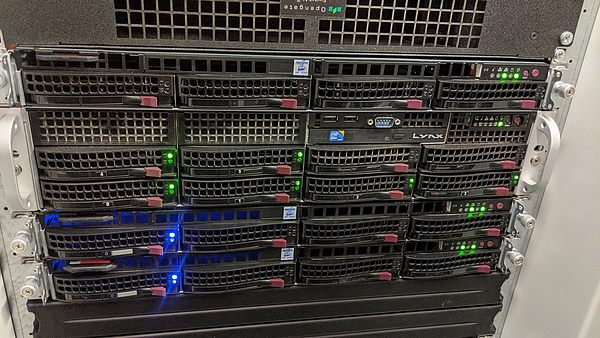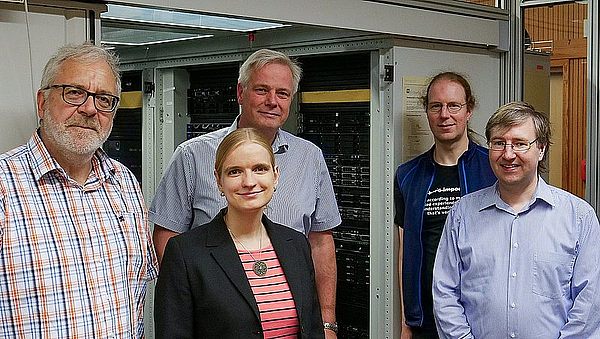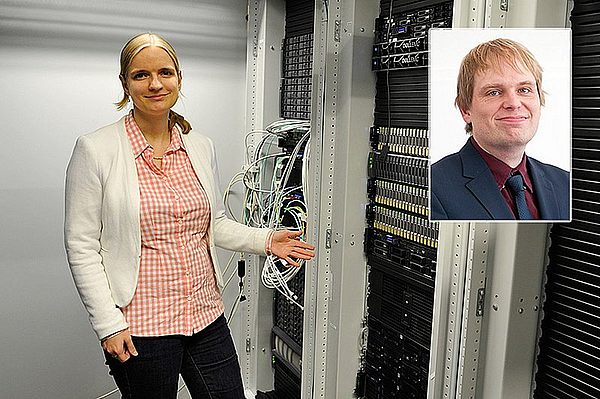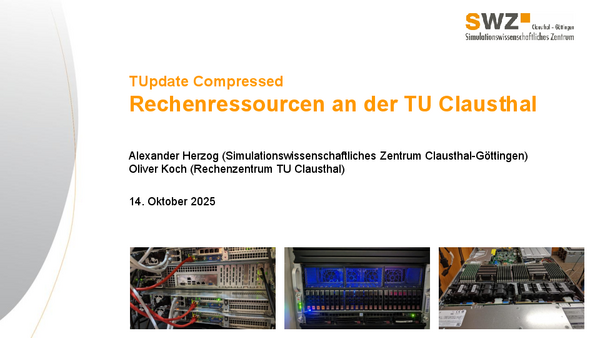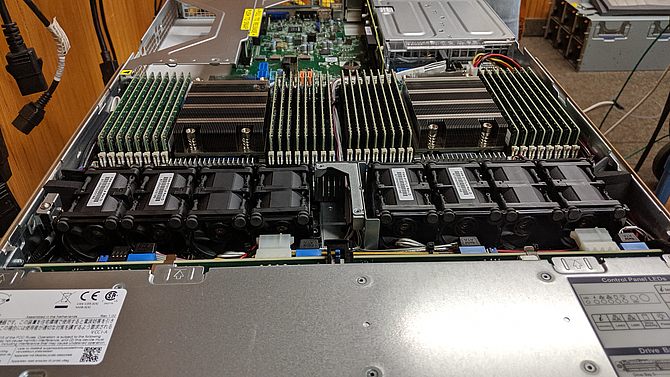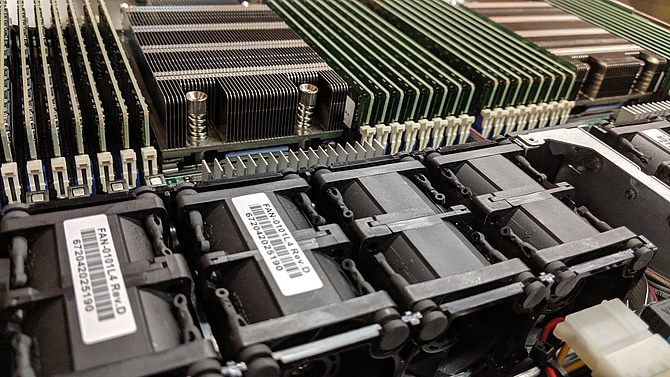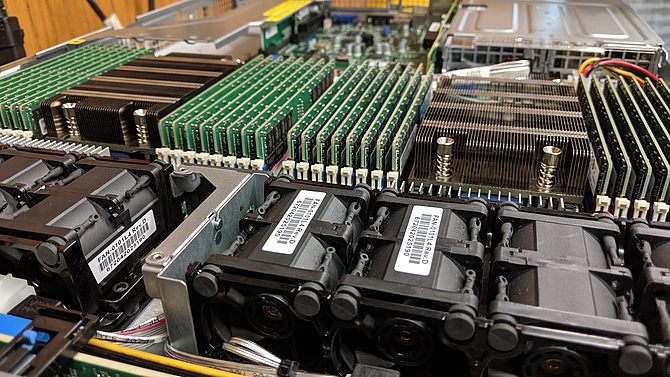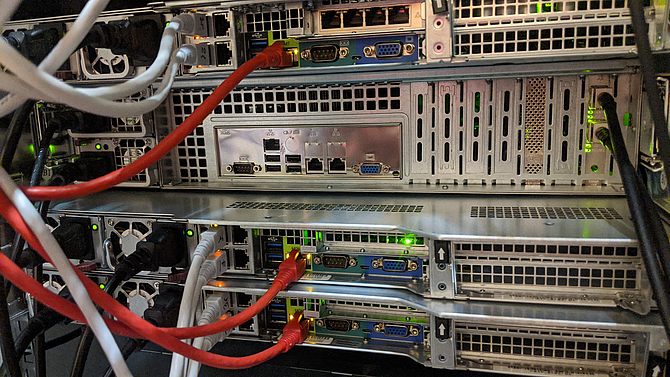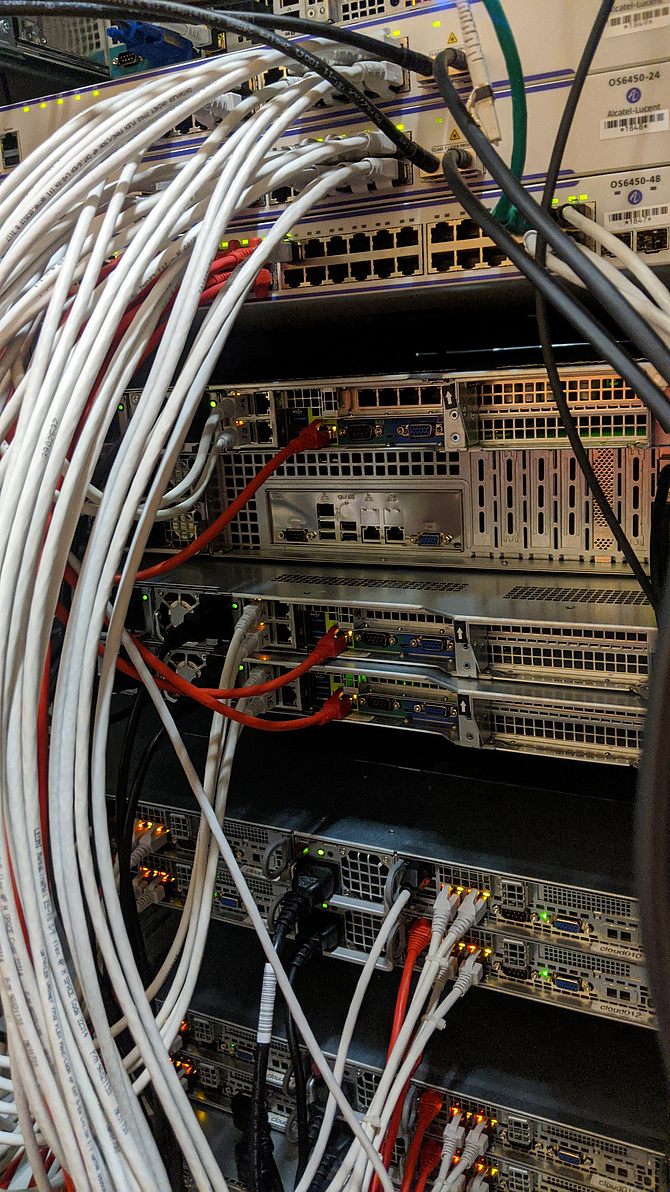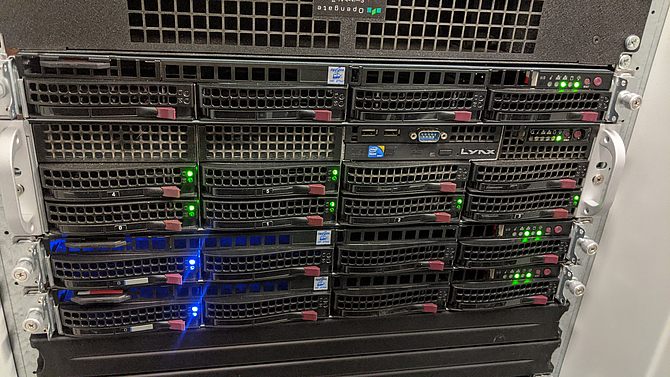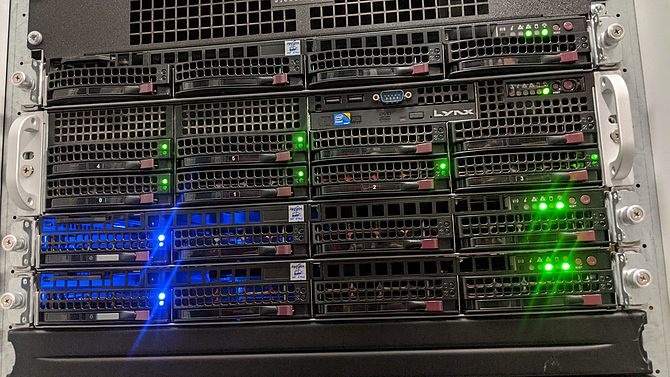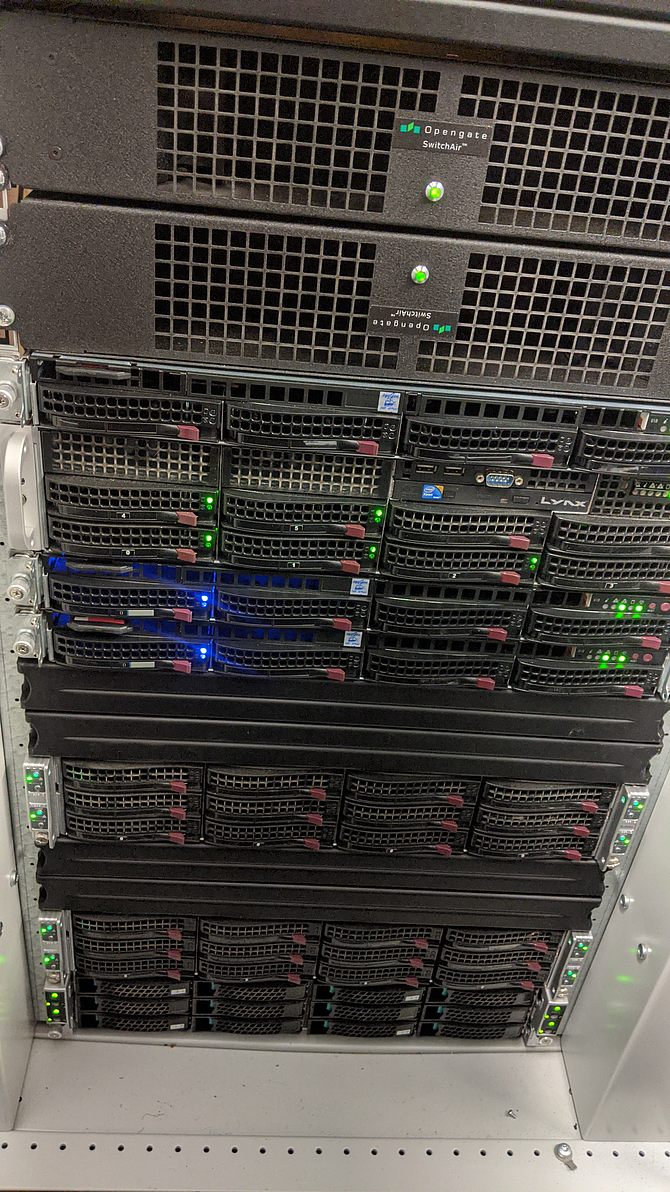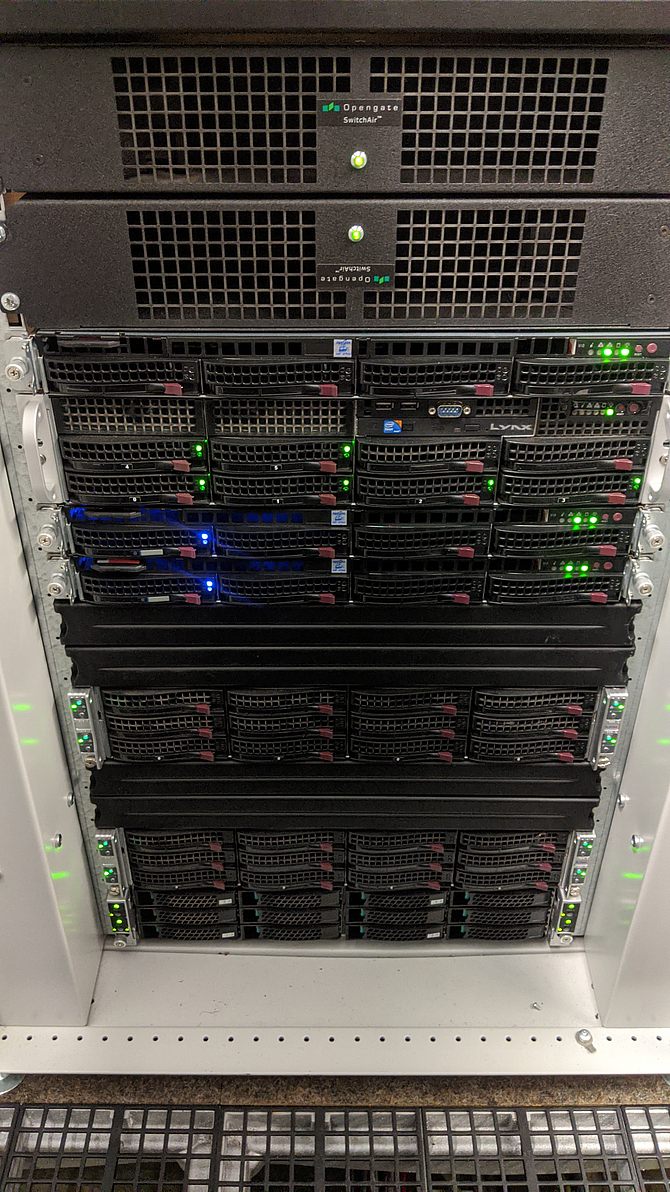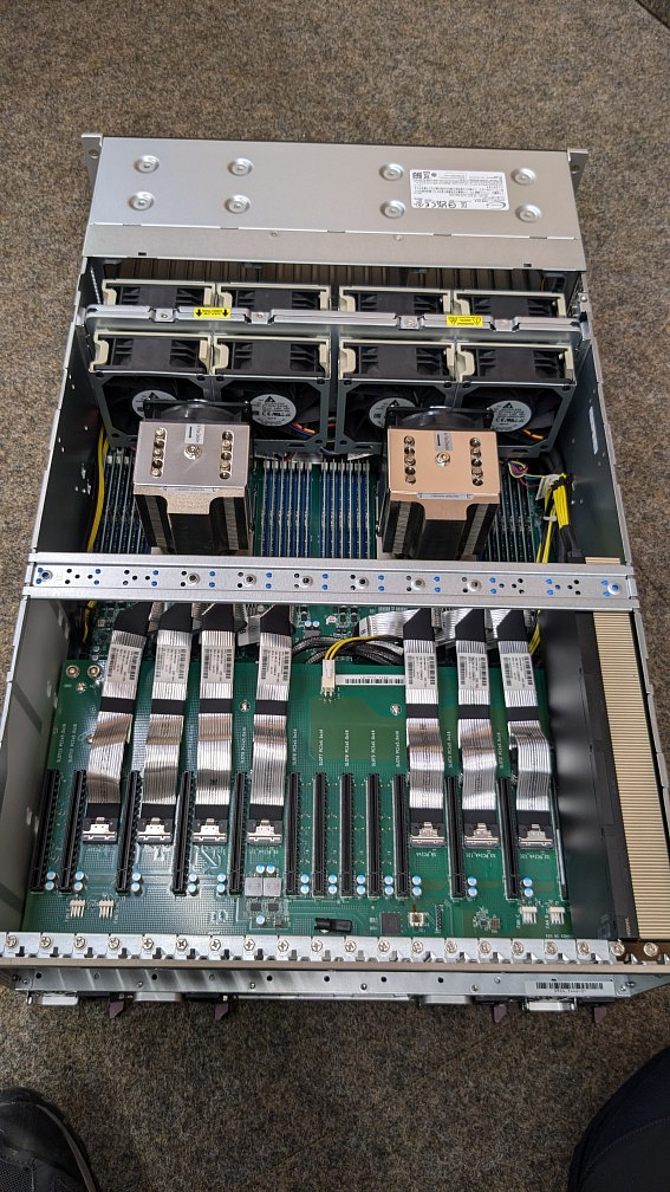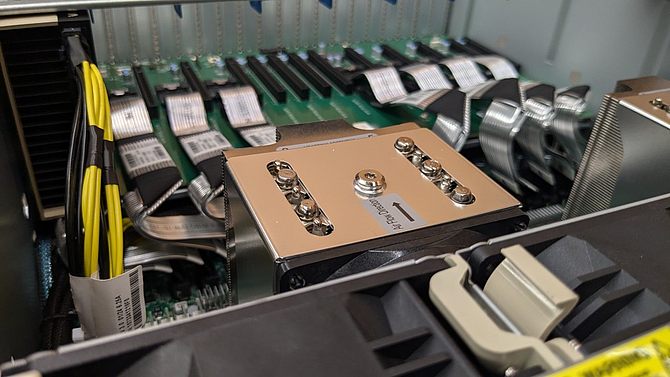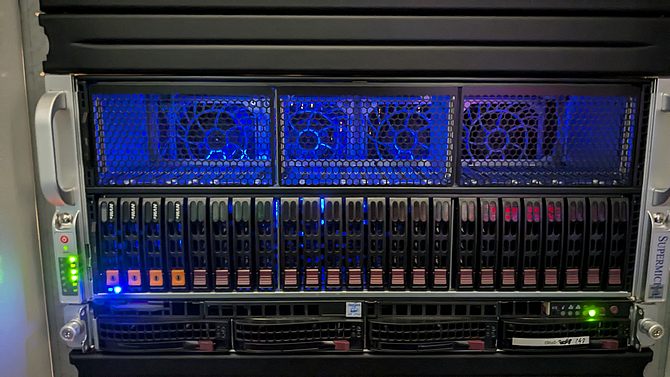Computing cluster
In September 2019, the Institutes of Technical Chemistry, Physical Chemistry, the Computing Center of Clausthal University of Technology and the Simulation Science Center Clausthal-Göttingen (SWZ) jointly put into operation a computing cluster that is available to all scientists at Clausthal University of Technology and members of the SWZ for research questions. The cluster is technically operated and maintained by the computer center; in terms of content, the SWZ coordinates the use and further development of the systems and works as a scientific exchange platform for the users of the computing nodes.
Technical specifications
The computing cluster consists of five nodes. The five computing nodes are 2-socket systems, each equipped with two AMD Epyc processors. Thus each node has 32 or 64 physical processor cores. Four of the systems are equipped with 1 TB RAM each, one system has 512 GB.
One of the nodes is freely accessible for all employees and students of TU Clausthal without further activation. The other four nodes require explicit activation (see contact details below). A separate application for computing time is not necessary for the use of the computing cluster.
- Node 1:
Netzwork name: as.rz.tu-clausthal.de ("Application Server")
CPUs: 2x AMD Epyc 7281 (32 physical cores in total)
RAM: 1024 GB
Storage: Connected to the storage system of TU Clausthal
Access: Already cleared for all TUC accounts - Node 2:
Netzwork name: cloud-244.rz.tu-clausthal.de
CPUs: 2x AMD Epyc 7282 (32 physical cores in total)
RAM: 1024 GB
Storage: Connected to the storage system of TU Clausthal
Access: informally on request, project-related - Node 3:
Netzwork name: cloud-248.rz.tu-clausthal.de
CPUs: 2x AMD Epyc 7281 (32 physical cores in total)
RAM: 512 GB
Storage: Connected to the storage system of TU Clausthal
Access: informally on request - Node 4:
Netzwork name: cloud-243.rz.tu-clausthal.de
CPUs: 2x AMD Epyc 7502 (64 physical cores in total)
Accelerator cards: Nvidia Tesla T4, Nvidia A100
RAM: 1024 GB
Storage: Connected to the storage system of TU Clausthal
Access: informally on request - Node 5:
Netzwork name: cloud-247.rz.tu-clausthal.de
CPUs: 2x AMD Epyc 9334 (64 physical cores in total)
Accelerator card: Nvidia H100 (adding more accelerator cards planned for 2026)
RAM: 1152 GB
Storage: Connected to the storage system of TU Clausthal
Access: informally on request
Installed software
In general, any scientific software, which is either available as a campus license at Clausthal University of Technology or is generally open source, can be installed on the computing cluster. The following programs are already available on the system (although this list does not claim to be complete):
- Abaqus
- Ansys
- Java
- Mathematica
- MatLab
- Anaconda
- OpenMPI
- Singularity
Access
- The access to the systems takes place under Linux via the SSH client of the respective system. Under Windows, for example, PuTTY can be used for control or X2Go for graphical use.
- The network share \\nas.tu-clausthal.de\unix-home$ is mapped on the computing node as home directory. (For more information on using the computing center file storage, see DokuWiki).
- Access via PuTTY and at file level via network sharing is only available from within the TU Clausthal network or alternatively via a VPN connection.
- The computing node as.rz.tu-clausthal.de is available to all students and staff of Clausthal University of Technology without further registration. For the other two nodes an explicit activation is required. A request for this can be made informally by e-mail to support@rz.tu-clausthal.de and requires no further justification.
- Due to the limited size of the system and in order to avoid making access unnecessarily complicated, the computing nodes do not have a batch system for allocating computing power. If larger computing time contingents or the more reliable availability of certain computing power is required, the HLRN can be used, for example.
- There is also a private channel in TUChat where cluster users can exchange ideas and coordinate the usage of the resources.
Users of the computing cluster
The computing cluster is used by the following research groups. This list is not exhaustive.
- Simulation Science Center, Research Group Computational Material Sciences/Engineering (N. Merkert)
- Institute of Technical Chemistry (M. Drache)
- Institute of Geo-Engineering, Chair of Geomatics for Underground Systems (J.-A. Paffenholz)
- Institut für Werkstoffkunde und Werkstofftechnik (U. Wolfram)
- Institute of Applied Mechanics, Research Group Solid Mechanics (St. Hartmann)
- Institute for Software and Systems Engineering (R. Ehlers)
Digitalisierung: Neuer Rechencluster in Betrieb
Chemie, Simulationswissenschaftliches Zentrum und Rechenzentrum nutzen gemeinsam leistungsstarken zentralen Rechenserver
Bei Digitalisierung ist oftmals von einem Querschnittsthema die Rede, für das an Universitäten Synergien genutzt werden sollen. Wie so etwas aussehen kann, zeigt ein Gemeinschaftsprojekt, das von dem Institut für Technische Chemie und dem Simulationswissenschaftlichen Zentrum (SWZ) an der TU Clausthal initiiert worden ist. Ein halbes Dutzend Institute und Einrichtungen nutzen mittlerweile im Verbund einen leistungsstarken zentralen Compute-Server. Weitere Nutzer sind im gerade gestarteten Verbund willkommen. [...]
Vollständige Meldung siehe: TU-Homepage
Digitalisierung in der Forschung schreitet an der TU voran
Leistungsstarker zentraler Rechenserver konnte dank finanzieller Mittel aus dem neuen Sonderforschungsbereich „Sauerstofffreie Produktion“ aufgerüstet werden.
Vor einem Jahr haben zwei chemische Institute der TU Clausthal, das Simulationswissenschaftliche Zentrum Clausthal-Göttingen (SWZ) und das Rechenzentrum in einem Gemeinschaftsprojekt einen neuen Rechencluster in Betrieb genommen. Inzwischen sind mehr als ein halbes Dutzend Einrichtungen daran beteiligt und der Verbund-CPU-Cluster ist in puncto Leistung bzw. Geschwindigkeit um einen vierten Rechenknoten mit zwei Beschleunigerkarten (GPU und FPGA) ausgebaut worden. [...]
Vollständige Meldung siehe: TU-Homepage
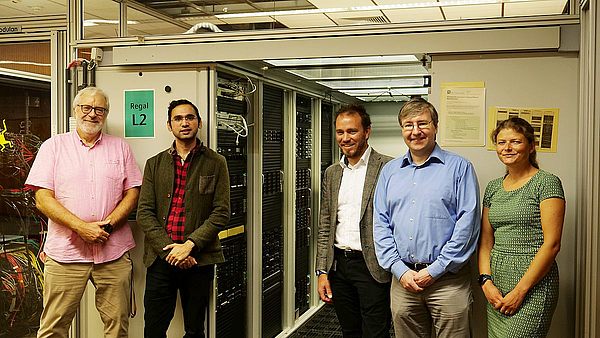
IT-Infrastruktur für die Forschung
Zentraler Rechencluster ist mit Mitteln des Simulationswissenschaftlichen Zentrums Clausthal-Göttingen um eine NVIDIA A100 erweitert worden
Deep Learning ist eine spezielle Methode zur Informationsverarbeitung und wird mittlerweile in zahlreichen Fachgebieten zur Analyse großer Datensätze benötigt. Umfangreiche Datenmengen werden zunächst von Algorithmen extrahiert, anschließend analysiert, um dann eine Schlussfolgerung oder Prognose über eine bestimmte Fragestellung abzuleiten. Das Erkennen von Mustern oder Dingen auf 2D-Bildern oder 3D-Umgebungen, das Verständnis von Texten oder die Optimierung von Entscheidungsprozessen stellen nur eine Auswahl von potentiellen Möglichkeiten der Methode dar. Ein typisches Beispiel ist die Fragestellung, ob sich ein bestimmtes Objekt wie eine Katze auf einem Foto befindet. Diese für einen Menschen triviale Aufgabe stellte ein Computerprogramm bis vor wenigen Jahren vor eine nahezu unlösbare Herausforderung. Erst als Rechner in die Lage versetzt wurden, automatisiert aus großen Datenmengen zu lernen, konnten sie diese Aufgaben mit hoher Zuverlässigkeit lösen. Für das Erkennen eines Objektes müssen viele fachspezifische Informationen wie das Aussehen aus unterschiedlichen Perspektiven oder das Farb- oder Größenspektrum vorliegen. [...]
Vollständige Meldung siehe: TU-Homepage
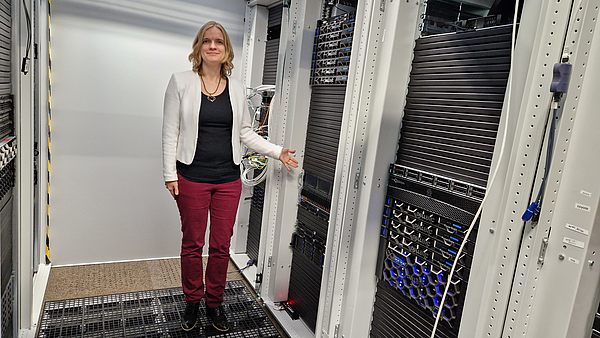
Rechencluster weiter ausgebaut
Rechencluster um einen weiteren Knoten inklusive einer Beschleunigerkarte ausgebaut
Der vom SWZ koordinierte zentrale Rechencluster an der TU Clausthal wurde mit Mitteln aus dem Teilprojekt von Prof. Dr. Nina Merkert des Sonderforschungsbereiches (SFB) 1368 „Sauerstofffreie Produktion“ weiter ausgebaut. ermöglicht. Ziel des Projekts ist die systematische Untersuchung der Bindung zwischen desoxidierten Fügepartnern für verschiedene Fügeverfahren mittels klassischer Molekulardynamiksimulationen. Es soll aufgeklärt werden, wie sich das Entfernen der Oxidschichten auf die zugrundeliegenden Mechanismen und damit auf die Verbindungsqualität auswirkt. [...]
Vollständige Meldung siehe: SWZ-Homepage
On October 14, 2025, the SWZ computing cluster was presented at a TUpdate Compressed event.
Contact
- Institute for Technical Chemistry
Dr. Marco Drache
E-Mail: Marco.Drache@tu-clausthal.de
Phone: +49 5323 72-2048
- Simulation Science Center Clausthal-Göttingen
Dr. Alexander Herzog
E-Mail: Alexander.Herzog@tu-clausthal.de
Phone: +49 5323 72-2966
- Computing Center (particularly for technical questions)
E-Mail: support@rz.tu-clausthal.de
![[Translate to English:] [Translate to English:]](/fileadmin/_processed_/9/7/csm_IMG_20200206_122627_de96267fb1.jpg)
